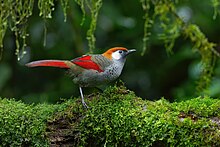Red-tailed laughingthrush: Difference between revisions
JJ Harrison (talk | contribs) No edit summary |
m →Behaviour: fix |
||
| Line 33: | Line 33: | ||
==Behaviour== |
==Behaviour== |
||
This species mainly feeds on insects and small arthropods (beetles, centipedes, etc.), but also on berries and fruits (especially of [[ |
This species mainly feeds on insects and small arthropods (beetles, centipedes, etc.), but also on berries and fruits (especially of [[Saurauia]] species). The breeding season lasts from April to June. The nest is made by both males and females and consists of a tidy cup mainly made of grasses and bamboo leaves.<ref name=hand/> It is built at about 1 m above the ground level. Females lay 2-3 eggs, that are incubated for 17–18 days. The chicks are fed by both parents and leave the nest in 14–16 days. |
||
==References== |
==References== |
||
Revision as of 18:53, 28 June 2024
| Red-tailed laughingthrush | |
|---|---|

| |
| Scientific classification | |
| Domain: | Eukaryota |
| Kingdom: | Animalia |
| Phylum: | Chordata |
| Class: | Aves |
| Order: | Passeriformes |
| Family: | Leiothrichidae |
| Genus: | Trochalopteron |
| Species: | T. milnei
|
| Binomial name | |
| Trochalopteron milnei David, 1874
| |
| Synonyms | |
| |
The red-tailed laughingthrush (Trochalopteron milnei) is a species of bird in the family Leiothrichidae.
Subspecies
Subspecies include:[2][3][4]
- Trochalopteron milnei milnei David, 1874 (NW Fujian, in SE China)
- Trochalopteron milnei sharpei Rippon, 1901 (N & E Myanmar, NW Thailand, N & C Laos, NW Vietnam, and S. China (W, S & SE Yunnan, W Guangxi).
- Trochalopteron milnei sinianum Stresemann, 1930 (SE China (SE Sichuan, N Guizhou, C & NE Guangxi, S. Hunan, N. Guangdong).
- Trochalopteron milnei vitryi (Delacour, 1932) (S. Laos, Vietnam)
Description
Trochalopteron milnei can reach a body length of about 26–28 cm (10–11 in) and a weight of about 66–93 g (2.3–3.3 oz). These medium-sized laughingthrushes are dull ochrous-grey, with a bright rufous-chestnut crown and a blackish face, with whitish ear-coverts. Wings and tail are crimson.[3]
Distribution and habitat

This species can be found in China, Laos, Myanmar, Thailand, and Vietnam.[2] These birds mainly inhabit the understorey of broadleaf evergreen forests,[3]
They are strictly montane, usually living at an elevation of 1,800–2,500 metres (5,900–8,200 ft) above sea level.[5]
Behaviour
This species mainly feeds on insects and small arthropods (beetles, centipedes, etc.), but also on berries and fruits (especially of Saurauia species). The breeding season lasts from April to June. The nest is made by both males and females and consists of a tidy cup mainly made of grasses and bamboo leaves.[3] It is built at about 1 m above the ground level. Females lay 2-3 eggs, that are incubated for 17–18 days. The chicks are fed by both parents and leave the nest in 14–16 days.
References
- ^ BirdLife International (2016). "Trochalopteron milnei". IUCN Red List of Threatened Species. 2016: e.T22715764A94468047. doi:10.2305/IUCN.UK.2016-3.RLTS.T22715764A94468047.en. Retrieved 16 November 2021.
- ^ a b Biolib
- ^ a b c d Collar, N. & Robson, C. (2019) Handbook of the Birds of the World Alive . Lynx Edicions, Barcelona
- ^ Gill F. & Donsker D. IOC World Bird List 7.3
- ^ Morten Strange Photographic Guide to the Birds of Thailand: Including Southeast Asia & the Philippines
External links
- Dollinger P. Zootier-Lexikon (in German)
- iNaturalist

